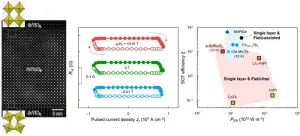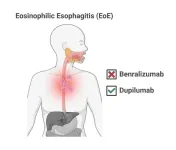(Press-News.org) Bottom Line: Patients with treatment-refractory cancers who received eligibility and testing waivers to participate in a large basket/umbrella oncology trial had similar rates of clinical benefit and adverse events as patients who participated in the trial without waivers.
Journal in Which the Study was Published: Clinical Cancer Research, a journal of the American Association for Cancer Research (AACR)
Author: Hans Gelderblom, MD, senior author of the study and chair of the Department of Medical Oncology at the Leiden University Medical Center in the Netherlands
Background: Eligibility requirements for clinical trials help protect patients whose comorbidities may put them at an additional risk of severe harm from the treatment being tested. Further, they help ensure that analyses are performed on a carefully controlled population, minimizing outliers that could skew the data.
However, the patients who will eventually receive the treatment are not homogeneous. New therapies hitting the market have not always been tested in patients with diverse backgrounds and medical histories. A 2015 study found that 39% of patients treated for renal cell carcinoma in clinical practice would not have been eligible for the trials leading to the approval of the drugs they received. Among patients in the general population treated with osimertinib (Tagrisso) for non-small cell lung cancer, 62% would have been ineligible for the phase III trial.
“It is well known that results in an ‘ideal’ population do not always translate to the real-world population,” Gelderblom said. “Eligibility criteria are often too strict, and educated exemptions by experienced investigators can help individual patients, especially in a last-resort trial.”
Such exemptions, which allow patients to participate in trials for which they would otherwise be ineligible, may include a lab test slightly outside the eligibility range, a necessary imaging scan completed outside the recommended window, or a tumor that could not be biopsied for safety reasons, Gelderblom explained. Whether these exemptions—or, by extension, the broadening of clinical trial eligibility criteria—lead to poorer patient outcomes has not been comprehensively studied, Gelderblom said.
How the Study was Conducted: Gelderblom and colleagues examined the effect of protocol waivers on patient outcomes in the Drug Rediscovery Protocol (DRUP) trial, a pan-cancer basket/umbrella trial that matches treatment-refractory patients with off-label targeted therapies based on their tumor’s genetic profile. Between September 2016 and September 2021, 1,019 patients were enrolled into DRUP, including 82 patients who received a protocol waiver.
The reasons for waivers were grouped into four categories: eligibility criteria exceptions, out-of-window testing, treatment exceptions, and testing exceptions. The most common waivers granted were exceptions to eligibility criteria, often due to out-of-range lab tests. The second most common waivers granted were for testing exceptions, often exemptions from a biopsy.
Results: At 16 weeks post-treatment, the clinical benefit rate was 40% among patients who received a protocol waiver, compared to 33% among patients who did not receive a waiver. Similarly, the median overall survival among patients who were and were not granted waivers was 11 months and 8 months, respectively.
Patients who received waivers were also no more likely to experience severe adverse events (SAEs) than patients who did not receive waivers; SAEs were observed in 39% of patients granted a waiver and 41% of patients without waivers. Gelderblom and colleagues also evaluated the likelihood that each SAE was caused by a protocol waiver in patients who received them. They deemed the relationship between waivers and SAEs “unlikely” for 86% of patients and “possible” for 14% of patients. The rates of treatment discontinuation due to toxicity or progression during the first treatment cycle were similar among patients who did and did not receive waivers.
Author’s Comments: Gelderblom emphasized that while the protocol exceptions studied in this trial were minor, they could have broader implications for the design of clinical trial eligibility criteria. “These findings advocate for a broader and more inclusive design when establishing novel trials, paving the way for a more effective and tailored application of cancer therapies in patients with advanced or refractory disease,” he said.
Study Limitations: Limitations of this study include a broad diversity in cancer types, treatments, and reasons for protocol exemptions among the assessed patients which, while improving the generalizability of study findings, precluded specific subgroup analyses. Further, because the likelihood of clinical benefit was an integral part of physicians’ decision to grant waivers, it is possible that patients who received waivers were positively selected for clinical benefit, compared to the general study population.
Funding & Disclosures: Funding for this study was provided by the Stelvio for Life Foundation, the Dutch Cancer Society, Amgen, AstraZeneca, Bayer, Boehringer Ingelheim, Bristol Myers Squibb, pharma&, Eisai Co., Ltd., Ipsen, Merck Sharp & Dohme, Novartis, Pfizer, and Roche. Gelderblom declares no conflicts of interest.
END
Patients receiving protocol exceptions to participate in targeted therapy trial experienced similar outcomes as eligible participants
Study highlights potential benefits of broadening eligibility criteria for clinical trials
2024-06-27
ELSE PRESS RELEASES FROM THIS DATE:
Magic mushrooms are the most-used psychedelic drug
2024-06-27
Psilocybin mushrooms are the psychedelic substance most often used in the U.S., with its popularity outpacing other psychedelic drugs such as MDMA (known as ecstasy), according to a new RAND report.
Based on a new national survey, researchers found that about 12% of respondents reported using psilocybin at some point over their lives and 3.1% reported using the substance over the past year. An estimated 8 million American adults used psilocybin in 2023.
Psychedelic substances such as psilocybin mushrooms and MDMA long have been touted as holding promise for treating various mental ...
Diagnostic stewardship approach to C. diff reduces unnecessary testing
2024-06-27
Arlington, Va. — June 27, 2024 — A new study published today in the American Journal of Infection Control (AJIC) describes the outcome of a new approach to testing for Clostridioides difficile (C. diff) guided by the principles of diagnostic stewardship. At Memorial Healthcare System in Hollywood, Fla., revised rules for when C. diff tests could be ordered helped to reduce inappropriate testing by 20%, which in turn can help rein in the overtreatment of patients.
C. diff is a common and potentially dangerous gastrointestinal pathogen, often linked to healthcare-associated infections ...
Materials research revolutionized by a small change
2024-06-27
Like the flutter of a butterfly's wings, sometimes small and minute changes can lead to big and unexpected results and changes in our lives. Recently, a team of researchers at Pohang University of Science and Technology (POSTECH) made a very small change to develop a material called “spin-orbit torque (SOT),” which is a hot topic in next-generation DRAM memory.
This research team, led by Professor Daesu Lee and Yongjoo Jo, a PhD candidate, from the Department of Physics and Professor Si-Young ...
How scientists build rotatory machines with molecules
2024-06-27
Machines have evolved to meet the demands of daily life and industrial use, with molecular-scale devices often exhibiting improved functionalities and mechanical movements. However, mastering the control of mechanics within solid-state molecular structures remains a significant challenge.
Researchers at Ulsan National Institute of Science and Technology (UNIST), South Korea have made a groundbreaking discovery that could pave the way for revolutionary advancements in data storage and beyond. Led by Professor Wonyoung Choe in the Department of Chemistry at UNIST), a team of scientists has developed zeolitic imidazolate frameworks (ZIFs) that mimic intricate machines. These molecular-scale ...
Two studies show mixed progress against EoE
2024-06-27
Despite high hopes, a drug that wipes out the namesake cell type associated with the disease eosinophilic esophagitis (EoE) doesn’t make patients feel better and doesn’t reverse tissue damage in their throats.
Meanwhile, data show that a different drug that had previously been approved for use in adults and teens with EoE is also safe and effective for children under 12 who weigh at least 15 kg (about 33 pounds).
The results of these clinical trials—plus an accompanying editorial—appear in the June 17, 2024, edition of The New England Journal of Medicine.
“Together, these ...
Why the harsh Snowball Earth kick-started our earliest multicellular ancestors: new study
2024-06-27
For a billion years, single-celled eukaryotes ruled the planet. Then around 700 million years ago during Snowball Earth — a geologic era when glaciers may have stretched as far as the Equator — a new creature burst into existence: the multicellular organism.
Why did multicellularity arise? Solving that mystery may help pinpoint life on other planets and explain the vast diversity and complexity seen on Earth today, from sea sponges to redwoods to human society.
Common wisdom holds that oxygen levels had to hit a certain threshold ...
Bin Wang receives Friedrich Wilhelm Bessel Research Award
2024-06-27
NORMAN, OKLA. – Bin Wang, a professor in the School of Sustainable Chemical, Biological and Materials Engineering at the University of Oklahoma, has received a Friedrich Wilhelm Bessel Research Award from the Alexander von Humboldt Foundation. Wang was selected for his contributions to computational catalysis and physical chemistry.
The Bessel Award is funded by the German Federal Ministry of Education and Research to foster collaborative relationships between international academics and German researchers. The award ...
Decline in UK coronary heart disease rates offset by rise in other cardiovascular conditions
2024-06-27
Rates of coronary heart disease in the UK have declined by about 30% over the past two decades, but this has been offset by rising rates of other conditions affecting the heart or blood vessels, finds a study in The BMJ today.
What’s more, improvements in rates of coronary heart disease almost exclusively appeared to benefit the over 60s, with little or no improvement in younger or more deprived groups, the results show.
As such, the researchers say future prevention strategies might need to consider a broader spectrum ...
Specialist weight-loss services in England unable to keep up with spiralling demand
2024-06-27
One in six integrated care boards (ICBs) in England have stopped accepting new patients for specialist weight management services as their referral numbers spiral out of control, an investigation by The BMJ has found.
ICBs are responsible for planning health services for their local population. At least seven out of 42 ICBs across the country - covering Manchester, Bristol, Suffolk, Leicester, Essex, and much of Yorkshire - have had to close a specialist (tier 3) weight management service list in their area, with many warning that demand is far exceeding capacity, reports Elisabeth Mahase.
Experts have said the rise in obesity and the demand for weight-loss injections may be fuelling ...
Cardiovascular health could be biggest risk factor for future dementia rates
2024-06-27
Dementia risk factors associated with cardiovascular health may have increased over time compared to factors such as smoking and having less education, finds a new study led by UCL researchers.
The study, published in The Lancet Public Health, explored how the prevalence of dementia risk factors had changed over time and how this could impact rates of dementia in the future.
It is estimated that there are currently 944,000 people living with dementia in the UK and 52% of the UK public – 34.5 million ...
LAST 30 PRESS RELEASES:
Blood test “clocks” predict when Alzheimer’s symptoms will start
Second pregnancy uniquely alters the female brain
Study shows low-field MRI is feasible for breast screening
Nanodevice produces continuous electricity from evaporation
Call me invasive: New evidence confirms the status of the giant Asian mantis in Europe
Scientists discover a key mechanism regulating how oxytocin is released in the mouse brain
Public and patient involvement in research is a balancing act of power
Scientists discover “bacterial constipation,” a new disease caused by gut-drying bacteria
DGIST identifies “magic blueprint” for converting carbon dioxide into resources through atom-level catalyst design
COVID-19 vaccination during pregnancy may help prevent preeclampsia
Menopausal hormone therapy not linked to increased risk of death
Chronic shortage of family doctors in England, reveals BMJ analysis
Booster jabs reduce the risks of COVID-19 deaths, study finds
Screening increases survival rate for stage IV breast cancer by 60%
ACC announces inaugural fellow for the Thad and Gerry Waites Rural Cardiovascular Research Fellowship
University of Oklahoma researchers develop durable hybrid materials for faster radiation detection
Medicaid disenrollment spikes at age 19, study finds
Turning agricultural waste into advanced materials: Review highlights how torrefaction could power a sustainable carbon future
New study warns emerging pollutants in livestock and aquaculture waste may threaten ecosystems and public health
Integrated rice–aquatic farming systems may hold the key to smarter nitrogen use and lower agricultural emissions
Hope for global banana farming in genetic discovery
Mirror image pheromones help beetles swipe right
Prenatal lead exposure related to worse cognitive function in adults
Research alert: Understanding substance use across the full spectrum of sexual identity
Pekingese, Shih Tzu and Staffordshire Bull Terrier among twelve dog breeds at risk of serious breathing condition
Selected dog breeds with most breathing trouble identified in new study
Interplay of class and gender may influence social judgments differently between cultures
Pollen counts can be predicted by machine learning models using meteorological data with more than 80% accuracy even a week ahead, for both grass and birch tree pollen, which could be key in effective
Rewriting our understanding of early hominin dispersal to Eurasia
Rising simultaneous wildfire risk compromises international firefighting efforts
[Press-News.org] Patients receiving protocol exceptions to participate in targeted therapy trial experienced similar outcomes as eligible participantsStudy highlights potential benefits of broadening eligibility criteria for clinical trials



